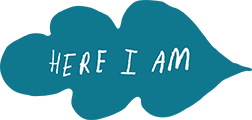6 Lessons learned about building a business, from Here I Am’s CEO and Co-Founder
Two years ago today, Here I Am Studio officially opened its virtual doors for business. That means Vi and I have now been business founders and owners for two whole years. Reflection is always healthy, and there’s never a more poignant moment to do that than on an anniversary.
So, here are some of our honest thoughts on how it’s felt to found and grow a business—as first-time entrepreneurs:
No amount of leading other peoples’ businesses will fully prepare you for owning your own.
Before starting a business, you may have worked at a more established organisation surrounded by a support network of HR, finance, and legal teams who quietly keep the wheels turning. All of sudden, as new business founders, they’re not there. It’s your responsibility to keep the business running, but you have no idea where to start. Everything feels as though it needs to be done right now—and the risks are high if you don’t do it properly. To say this is highly stressful is an understatement.
Owning a business does not suddenly make you the all-seeing oracle you hope to be.
You have no boss or safety net. It all starts and stops with you. Everyone that works for you needs to believe that you know what you’re doing. But the truth is that on a daily—sometimes even hourly basis—you won’t. And that’s completely normal and fine.
You feel like you need to do everything, everywhere, all at once.
There is so much to do seemingly urgently, and the bureaucracy is relentless. A never-ending stream of important decisions needs to be made—matters like the company name, positioning, service offer, team, and hundreds of other assets. You need to create policies, contracts, a website, and social media profiles. The to-do list is ever-growing.
I recently attended an Innovate UK bootcamp for leading female entrepreneurs. During one bootcamp session, a successful female leader said, “Let’s be honest. Founding your own company is sh•t.” And everyone laughed in agreement.
Because it is. Founding a company can be inexplicably challenging and stressful. But it’s also not. There are numerous aspects of running a business that surmounts the cons. After two years as CEO and Co-founder, this is what I’ve learned:
You don’t need to do everything immediately and perfectly.
The Eisenhower matrix has continued to be as useful as ever in helping us prioritise tasks. We’ve grown better at asking ourselves, “How well done does this need to be done?” As a new business owner, remember—nothing is indelible. It's just the first iteration for now.
For example, we created our website in just two weeks when we started Here I Am, and it showed. But it was good enough. We had other more pressing matters to prioritise. Now, two years after our inception, we’ve launched a better, more refined version. Check it out.
You do have bosses—they just exist in different shapes and sizes.
Every day, our clients, team, and wider network of advisors hold us accountable and teach us how we can be better. They’re the best bosses we’ve ever had. Thanks to them, our learning curve has been vertical and we are much wiser women today because of it.
Knowing your blind spots is a strength.
On reflection, the fact that on a daily—or hourly—basis, we recognise our blind spots is an immense strength. It’s surely contributed to Here I Am’s healthy growth as a business. To fill our gaps as leaders, we’ve surrounded ourselves with a big, diverse support network of brilliant people who we constantly pester for advice or feedback—often at a moment’s notice, with little to offer in return.
To put it simply, it really does take a village to found and grow a company.
So today, on our second birthday, we would like to thank our village for their continued support and guidance to help us make the right choices. It’s been an incredible journey and we can’t wait to see where the next two years take us.
Special thanks to my village co-chief, Vi, for making everything possible.
With love and thanks, Laura
Inspired by this post?
We love to share perspectives, thoughts and ideas on creating digital ways to include the excluded. If you have a problem you'd like to discuss, we'd love to hear from you.




